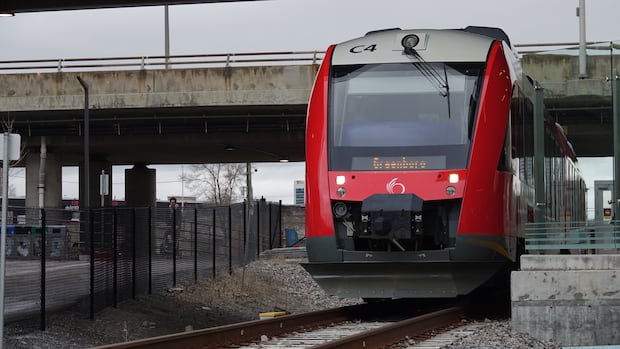OttawaThe city is asking for more than $150 million in extra funding for the O-Train next year as delays and legal fees push up costs, while a contingency buffer needs to be padded again.Price tag originally set at $4.7B, but council once again asked to top up contingency bufferListen to this articleEstimated 4 minutesThe audio version of this article is generated by text-to-speech, a technology based on artificial intelligence.The O-Train Line 2 between Bayview and Limebank stations opened in January, two years behind schedule. (Francis Ferland/CBC News)The city is asking for $156.5 million in extra funding for the O-Train next year as delays and legal fees push up costs, while a contingency buffer needs to be padded again.The funding is part of the 2026 draft municipal budget. Most of it would go to Stage 2, which was approved in 2019 with a price tag then estimated at $4.66 billion. The latest request, which still needs council approval, isn’t the first time the project budget has swelled. OC Transpo media relations confirmed to CBC that it now stands at $5.06 billion.Stage 2 involves three extensions to the existing rail network, including links to the east and west that are still underway, plus the Trillium Line expansion to the south that opened more than two years behind schedule.The draft budget document released last week says delays to all three extensions “have introduced pressures on the project oversight budget,” while project changes, risks and claims require more funding for contingency. It asks for an extra $150 million in response, plus a separate sum of $6.5 million to cover costs for the existing Stage 1 rail line.The Stage 2 contingency was initially set at just over three per cent of total project costs, or about $152 million, as a cushion against price increases and potential legal disputes. It was later increased to about $287 million due to “unforeseen costs and improvements,” but all but $18 million of that money was committed as of this September.Councillor wants answersThe brief explanation in the budget document provided little detail on why the added funding is needed. OC Transpo pointed CBC to previous reports that warned of a “further pressure of up to $53 million” for residual risks and forecast costs. At the time, city staff held off on making a formal request for that money.But Kitchissippi Coun. Jeff Leiper, vice-chair of council’s transit committee and a member of the city’s powerful finance and corporate services committee that oversees the budget request, said the new number is much higher.”There’s a significant difference between the previously forecast pressures and the $150 million contingency that’s in front of council right now, and it’s critical that we get an explanation for that,” Leiper said in an interview Tuesday.”It’s obviously a very large amount of money, and we need to better understand why the costs have escalated so much.” Laura Shantz, a board member of Ottawa Transit Riders, says the city should learn lessons from the cost increases. (Francis Ferland/CBC)Laura Shantz, a board member of the advocacy group Ottawa Transit Riders, said the growing costs should teach the city a lesson.”We know there’s been some big hiccups. There’s been big delays, big challenges,” she said. “But this is not the first time the city has signed such a contract. We need to start thinking about how we plan this better.”Stage 1 needs more money, tooCouncil has voted to top up the Stage 2 budget at least twice before. In 2022, it put an additional $25 million into the contingency and approved an extra $35 million for increased utility costs.But the contingency was on the verge of running out again by 2023, when council added another $110 million to the buffer, plus $42 million for oversight costs.The 2026 draft budget is also asking councillors to approve $6.5 million in added funding for the already completed Stage 1 project, which built the existing east-west line from Tunney’s Pasture to Blair stations.About $5 million of that sum would support “expert and legal support costs related to the resolution of the remaining claims and disputes.”The city has been enmeshed in long-running legal battles with Rideau Transit Group and Rideau Transit Maintenance, the consortia that built and maintain the LRT. The remaining Stage 1 funding boost is needed to pay for “issues related to the cartridge bearing assembly.”The existing LRT has been plagued by faulty bearing assemblies that were blamed for a derailment in 2021.The combined $156.5 million in added funding for 2026 would be funded by a combination of debt and development charges on new homes.The 2026 draft budget also includes a forecast for added O-Train spending from 2027 to 2029.The estimated increase during that period is $33.6 million, over and above next year’s funding boost.ABOUT THE AUTHORArthur White-Crummey is a reporter at CBC Ottawa. He has previously worked as a reporter in Saskatchewan covering the courts, city hall and the provincial legislature. You can reach him at arthur.white-crummey@cbc.ca.
Thursday, 5 Mar 2026
Canada – The Illusion
Search
Have an existing account?
Sign In
© 2022 Foxiz News Network. Ruby Design Company. All Rights Reserved.
You May also Like
- More News:
- history
- Standing Bear Network
- John Gonzalez
- ᐊᔭᐦᑊ ayahp — It happened
- Creation
- Beneath the Water
- Olympic gold medal
- Jim Thorpe
- type O blood
- the bringer of life
- Raven
- Wás’agi
- NoiseCat
- 'Sugarcane'
- The rivers still sing
- ᑲᓂᐸᐏᐟ ᒪᐢᑿ
- ᐅᑳᐤ okâw — We remember
- ᐊᓂᓈᐯᐃᐧᐣ aninâpêwin — Truth
- This is what it means to be human.
- Nokoma











